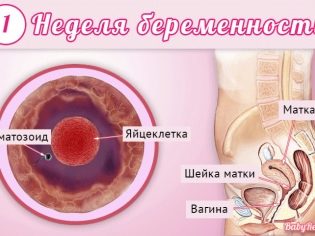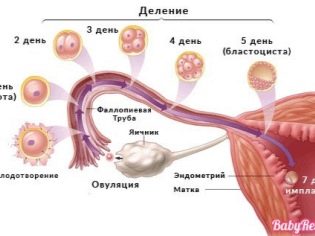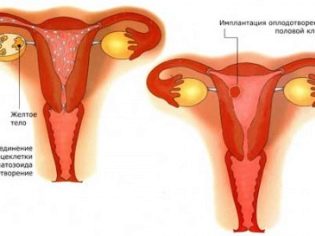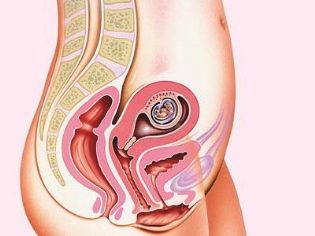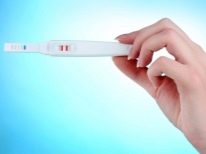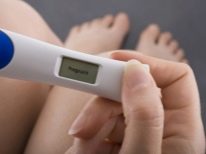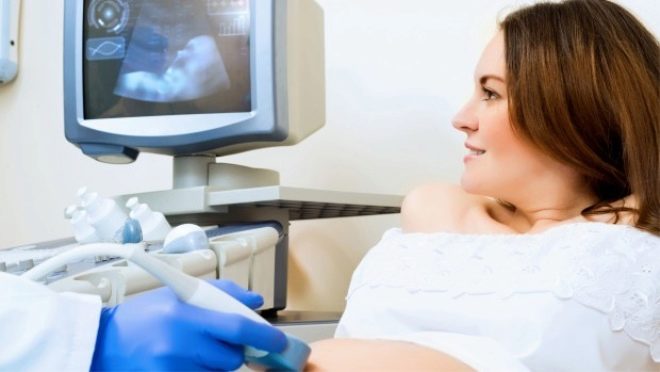Symptoms and sensations in the first week of pregnancy
The origin of a new life is always a big mystery of nature. In the early stages after conception, it is rather difficult to determine pregnancy. This article will help you figure out how this can be done.
Determining the exact date
The conception (fertilization) is considered the immediate moment of the birth of human life - the moment when the sperm cell penetrates the egg cell. At this time, and there is a completely new biological unit - the future baby. Fertilized egg experts call a zygote. In the first hours after fertilization, the zygote consists of only a few cells. In the future, it begins to be very fragmented, and the number of cells is rapidly increasing.
From the moment of fertilization, a special clinical condition occurs, which is called pregnancy. After a few months of pregnancy, a baby with a microscopic size will grow to several tens of centimeters. This process is truly unique.
To determine the duration of pregnancy, doctors use various techniques. 1 week from the moment of conception is determined directly from the date of fertilization. Usually, it can accurately identify a woman who purposefully and very carefully prepares for motherhood.
The method of counting obstetric weeks is used by obstetrician-gynecologists. To do this, they determine the duration of pregnancy, using the date of the last menstruation. It is from her that the first and all subsequent obstetric weeks are counted. In this case, the total duration of carrying a baby is 40 weeks.
Sensations
In the very first hours after fertilization, the woman does not feel anything special. She still does not experience any unusual sensations.
The zygote that has formed has microscopic dimensions. Immediately after the merger of germ cells, the level of hormones in the blood of a woman remains within normal limits. Hormonal background will change somewhat later, when the size of the fertilized egg will increase. The growth of hormone levels usually begins after the implantation of an egg into the wall of the uterus.
Usually the process of implantation (attachment) occurs at 6-7 days after fertilization. It is at this time that a woman can feel certain changes in herself. They mostly resemble sensations similar to those experienced by some women with premenstrual syndrome (PMS).
The first noticeable symptoms usually occur just at the time of implantation of a small embryo, that is, by the end of the first week after conception.
It should be noted that the severity of these clinical manifestations is negligible. Quite a lot of women note that at this time they did not notice any specific or unusual symptoms during this period.
Discharge from the genital tract
These appear due to the fact that the implantation process is taking place. During the "implantation" of the embryo into the endometrium (inner layer of the uterine wall), its slight damage occurs. It is intended by nature to ensure that the future baby is quite tightly attached to the wall of the uterus.
As a rule, after 6-8 days after conception, a woman has vaginal discharge. They usually have a brown or reddish color. By volume, such secretions may be different, but usually their number is moderate or minor. Since the discharge may be accompanied by the appearance of other symptoms, this makes it possible for the woman to think that she just had her period. Most women attribute these symptoms to a strayed menstrual cycle or hormonal changes.
However, these secretions usually have a number of features. They do not last long - just one, maximum two days. In some women, such brown discharge may be single. In this case, as a rule, the expectant mother notices them in her underwear.
Obstetricians and gynecologists who work with pregnant women, note that, according to statistics, such discharge alarm women rather rarely. In most cases, they are simply ignored or interpreted in favor of the onset of sudden menstruation.
Note that the discharge does not always occur, but this does not mean that the implantation did not occur - just a small amount of blood that is released during this process is mixed with urine when urinating, and the woman simply does not notice.
Soreness in the abdomen
In the first hours after fertilization, pain does not occur in a woman. Soreness usually occurs by the end of the first week from the moment of conception. A woman may feel that she has a lower abdomen or discomfort in this area. These non-specific symptoms are also often attributed to PMS.
Usually the pain symptom is expressed slightly or moderately enough. The pain is well removed while taking painkillers. In a horizontal position, the pain decreases. Also, weightlifting or too intense exercise in the gym can lead to increased pain.
Nausea
This symptom can also occur in the very early stages of pregnancy, and its severity can be different. Some women note that in the first days of pregnancy they did not feel nauseous, while others say that this adverse symptom was quite pronounced.
Nausea is a very pronounced discomfort symptom. It can appear at any time of the day. Many women believe that the classic symptom of pregnancy is nausea in the morning, but this is not the case. This symptom can occur at any time.
Nausea can also worsen after consuming any food, even favorite foods that are often used can contribute to nausea. Also, some women have a feeling of subjective intolerance to tobacco smoke. Inhalation of cigarette smoke can also contribute to nausea or poor health.
Mood change
Emotional shifts are usually subject to quite emotional women. However, every day of pregnancy, as the hormonal changes, mood changes can occur in pretty calm women.
This is facilitated by the gradual increase in the blood of specific hormones. With each subsequent day of embryonic development of the baby, the level of hormonal substances will increase. This is necessary so that the child can fully grow and develop in my mother's belly.
Mood changes may vary. The most characteristic feature is a fairly quick change of joy and even euphoria to a depressed state. Some women have excessive tearfulness. Aggressive behavior can also be a manifestation of pregnancy. Bursts of anger can vary in duration, but usually they are short-lived. After that, the mood can change again and become joyful.
Progesterone increasing in the blood leads to the appearance of excessive aggressiveness in women at this time. This hormone is one of the most important during pregnancy. Under its influence, there are quite a lot of different biological reactions aimed at the development of an embryo located in the uterus.
Degradation of performance
Fatigue is one of the possible signs of pregnancy. The decrease in tolerance to habitual loads may indicate that all the forces of the body are now aimed at maintaining the viability of a small embryo that is in the uterus.
Not all women develop a decrease in performance. The development of this symptom is influenced by a lot of related causes, as well as the presence of any chronic diseases in the woman. That is why it is almost impossible to suspect pregnancy on such a short period only for clinical symptoms.
Signs of pregnancy in the earliest terms
After fertilization of the egg, a number of changes begin to occur in the female body, but they develop rather slowly. The severity of such manifestations also varies. Possible symptoms of pregnancy include the following symptoms.
- Increase in basal temperature. After fertilization, it grows, which is well traced on the chart. If a woman prepares for pregnancy and measures her basal temperature regularly throughout the entire menstrual cycle, then she will easily notice such an increase.
- The coarsening of the mammary glands. Chest looks swollen. The mammary glands may increase slightly and even ache.
- The appearance of mucus from the vagina. Increased mucous secretions may indicate changes in the work of female reproductive organs due to pregnancy. The severity of this symptom is different - from minor to fairly intense.
- Pulling sensation in the lower back. Usually this symptom manifests itself after playing sports or lifting weights, so many women do not emphasize it. After a rest, the discomfort in the lower back usually disappears.
How to determine pregnancy at this time?
A classic sign that in most cases causes women to go to a pharmacy for a pregnancy test is a delay in menstruation.
Currently, the pharmaceutical market offers a huge variety of different diagnostic systems. They differ in cost, accuracy, design and much more. It should be noted that modern tests are fairly accurate and allow you to determine the presence of pregnancy with a fairly high probability.
It is believed that a pregnancy test with the result can be done already 10-12 days after fertilization of the egg, but for the first week there is no exact method.
Determination of pregnancy in this case is carried out by determining in the urine of specific gonadotropin (hCG). During pregnancy, its norms are significantly different - first, hCG appears and increases in the blood, and then in the urine.
Determination of pregnancy basic test strips is quite simple. For this you need a little urine, which is usually collected in the morning. Many women are in such a hurry to find out if they have a pregnancy, that they use the test in the evening or at any time of the day. It should be noted that At such an early date, obtaining an accurate test result may not be possible. In the morning, the concentration of hCG in the urine is the maximum, which is necessary for such a test.
Determination of pregnancy with the help of test strips purchased at a pharmacy is only an indicative test. The result obtained in the home, when applying this diagnostic method is not always reliable and accurate.
Reliably determine the signs of pregnancy can only gynecologist. To do this, he conducts a full clinical examination on the gynecological chair.At the same time, he assesses the tone and condition of the cervix, as well as the dimensions of its cavity.
It is possible to confirm the presence of pregnancy in the early stages by analyzing the determination of hCG in the blood. For the analysis will need a little venous blood. The accuracy of the laboratory test is quite high, and the excess of hCG concentration over the norm may indicate the presence of pregnancy. It is worth noting that the level of this hormone in the blood can be increased in non-pregnant women with certain diseases. In order to confirm pregnancy, one should double-check the result after some time.
Also, in order to find out about the presence of an embryo in the uterus, ultrasound examinations are used. More informative and accurate in this case is transvaginal ultrasound.
It is important to remember that errors may be made during the ultrasound scan, or technical errors may be made. In this case, you also need to double-check the result after a while.
Possible problems
The first weeks of pregnancy are a very important stage of intrauterine development of the fetus. The health of the future mother plays a very important role for the full growth of a small embryo. A cold or infection can have a negative effect on the development of the crumbs and lead to the development of a number of dangerous pathologies.
The treatment of diseases in pregnant women must be approached very carefully. Not all folk remedies at this stage can be safe for the embryo. Some antibiotics can have a particularly adverse effect on the developing fetus.
With the appearance of thrush, be sure to contact a gynecologist. The doctor will conduct the necessary examination and, if necessary, prescribe fluconazole or another anti-candidate remedy.
From the first days of pregnancy should stop taking any alcoholic beverages. Alcohol strength does not play a special role. All beverages containing ethyl alcohol adversely affect the fetus and may even cause a lag in its development.
Since the establishment of pregnancy, the doctor will definitely recommend the expectant mother to take multivitamin complexes - this is necessary in order to fill the increased need for vitamins in the body. As such drugs are used a variety of means: "Feimbion", "Prenatal", "Elevit Pronatal" and many others.
About what happens to the future mother in the first week of pregnancy, see the next video.


